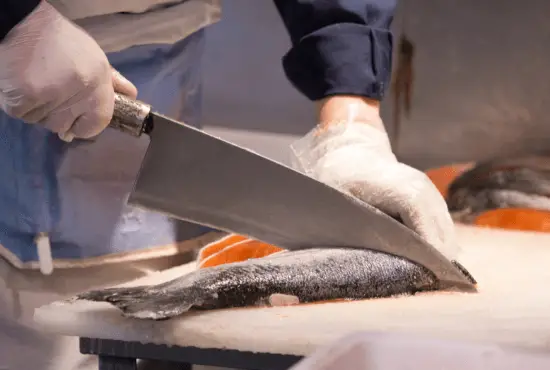Being a host of health benefits, salmon is a central part of many cuisines, and it tastes other-worldly. It also makes it very hard to find and expensive. If you randomly saw it at a market one day, but with the scales on, you might have thought of dropping the idea of buying.
It is too much labor to de-scale a salmon. So, is it possible to eat the fish with the skin and scales? Or do you have to remove it at any cost?
You can eat salmon skin with scales, and it is safe for consumption. If you are unfamiliar with scales, you may find the texture odd, but it is otherwise unharmful for your health. Cooking technique plays a vital role in determining whether the fish scales will turn out delicious or not. Avoid boiling them and instead opt for baking, frying, or grilling. It turns the fish crispy, and you will enjoy the overall combo.
De-scaling fish is a common practice, but it is not compulsory. The outer skin has many proven advantages, and many seafood lovers want to try it. If you are one of them, this article will tell you everything you need to know about eating fish scales.
Table of Contents
Eating Salmon Skin With Scales: Is It OK?
With each passing day, the popularity of salmon is increasing, and the credit goes to its rich flavors and high nutrient value. It is considered one of the best protein, omega-3 fatty acids sources, vital for the body. However, you might have noticed that salmon available in the market mostly has skin and scales on them.
The reason is that the skin is edible, with and without the scales. The skin has the same nutrient percentage and proteins as the fish itself. Many people across the globe prefer eating salmon with the skin as they enjoy its texture and distinct taste. But, it depends upon your liking if you want it with or without the outer layering.
From a safety point of view, eating salmon skin with scales is not harmful, and there are many benefits of eating them. Nevertheless, how the fish was prepared and cooked has its significance. A good cooking technique ensures that the salmon skin is flavorful rather than plain and boring.
Also, scales can create an odd crunchy texture, and some find that annoying. However, leaving the scales when baking or cooking the salmon allows the skin to remain moist and tender. That is why many seafood restaurants keep the skin with scales. It also helps in cutting down unnecessary food wastage.
What Makes Salmon Scales Unpleasant To Eat?
The main issue with eating salmon with the scales is the unappealing texture. They are dry and hard, resembling toenail clippings. It also can get stuck in your throat and hurt your mouth.
However, it has low chances, and overall the scales are not harmful. Salmon skin has an ample amount of minerals and healthy fatty acids.
However, many people do not mind the texture of the scales, and if you eat them regularly, you might not even notice them. Also, how you cook the salmon has a role in deciding whether you’ll feel the scales or not. Some recipes like grilling or roasting fish that maximizes its crunchiness can be a great way to incorporate the scales into the dish. The scales allow the fish skin to remain tender and soft.
If you don’t prefer fish with skin and scales, you can always peel them off after cooking. Besides, if you have any digestive troubles, you should refrain from them as they can potentially damage your digestive system. They might tear the tissues of your throat upon swallowing them and lead to an emergency.
Are There Any Health Benefits Of Eating Salmon Skin And Scales?
It is a widely known fact salmon skin and scales possess plenty of health benefits. For instance, collagen is abundant in them which is great for your bones, skin, tissues, and tendons. When you eat salmon skin with scales, you increase your collagen intake. It is a much more economical option than spending extra money on collagen capsules.
Salmon skin also contains many vitamins and minerals that are good for your body. Most people have them in their diet for the sole reason of being rich in omega-3. The skin is where you find it in the highest amount, and that is why you must consider not skipping it.
However, many people remove the skin simply because it is unappetizing. But, it depends upon your cooking style and recipe and how the final results will turn out. When you roast or fry the salmon, the skin becomes crispy, and the overall combination feels good to the mouth. It also keeps the fish succulent and enhances the flavors.
Also, wild salmon skin offers more benefits than its farmed counterparts. In wild salmons, the skin is healthy, and you can barely tell if there are any scales. On the other hand, farmed fish skin does not provide much nutritional value.
The Perfect Way To Cook Salmon Skin-on
If you have decided to try out salmon with the skin, you might know the correct cooking process to get the optimum flavors. The best method to prepare the fish skin is through frying or grilling it. Other techniques like boiling or steaming can turn the salmon soggy, and you do not want that.
The skin act like a safety layer between the fish’s flesh and a hot pan/grill. So, you get a crispy outer layer and soft inner meat. It is also easy to slide a spatula under salmon skin than its delicate flesh. It will also remain intact in the cooking process. Always start with the skin side down and allow it to get crisp before flipping.
To further enhance the flavors, you can add seasoning, spices, and other ingredients of your choice. You will end up with a delicious meal that is also great for your well-being.
How To Remove Salmon Scales And Leave The Skin?
Sometimes, the salmon you buy can have larger scales that are not good to consume. Or, you might be preparing a dish that requires a cleaner-looking fish. So, if you are wondering how to get rid of the scales, the process is simple.
- Grab a sharp knife and run the blade against the grain of the scales, and they will begin to flake off.
- Do this process over a kitchen sink to prevent them from scattering all over you and the dinner.
- Once you remove all the scales, rinse the salmon skin to eliminate any loose scale left behind.
- Now that the fish has smooth skin, you can go ahead and cook it as per your liking.
- If you see small scales on the skin, leave them as it is harder to remove. Once you cook the fish, they will be hardly noticeable.
Why Should You Avoid Eating Salmon Skin With Scales?
Eating salmon scales has its own set of advantages, but there are a few points that you need to consider. Firstly, you must buy the fish as fresh as possible and from a reputable place. Unfresh fish may have toxins and bacteria build-up in the skin. Upon consuming it, you can develop stomach-related illnesses.
Secondly, as much as scales are nutritious, they tend to stick in the teeth and throat and create discomfort. This problem can be more alarming if you serve them to children. So, you must be a little cautious. Also, their texture can feel crunchy, and you might struggle with chewing them. So, go ahead with eating the scales only when you feel comfortable with them.
Conclusion
Eating salmon skin with scales is safe and common practice in many regions. They are packed with nutrients and prove good for your health. The small scales are usually not that noticeable if you bake, fry, or grill the fish. Larger ones are more prominent, and eating them can be an unpleasant experience. You can remove them easily at home with the help of a knife.
It is all about your liking if you want to have the salmon with the scales or without them. Some people may find the crunchy texture annoying, and others enjoy them. Wild salmon skin is more beneficial than the farmed variety as it feeds on a more natural diet.
You can try out different recipes to get used to the scales. However, if you are not having a good time with them, you can remove them after cooking the salmon. Either way, it tastes delicious, and you can pair it up with different food items.
Recommended Readings:


